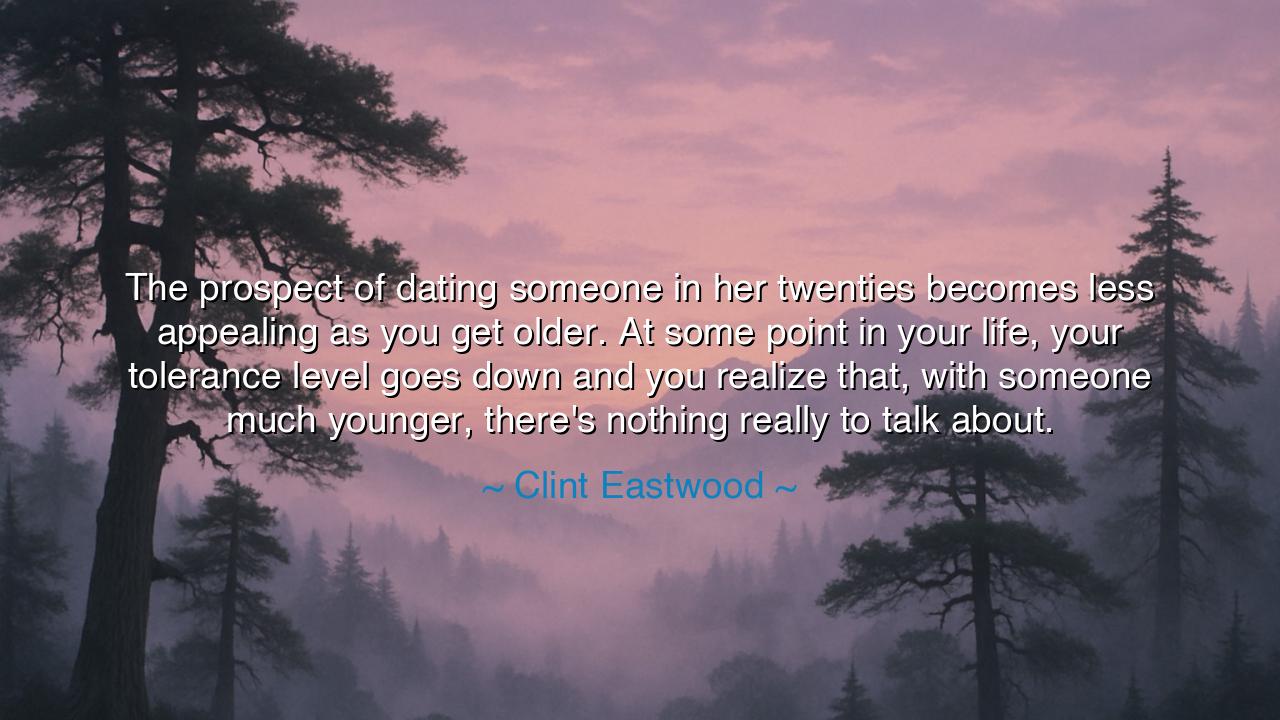
The prospect of dating someone in her twenties becomes less
The prospect of dating someone in her twenties becomes less appealing as you get older. At some point in your life, your tolerance level goes down and you realize that, with someone much younger, there's nothing really to talk about.






The words of Clint Eastwood—“The prospect of dating someone in her twenties becomes less appealing as you get older. At some point in your life, your tolerance level goes down and you realize that, with someone much younger, there’s nothing really to talk about”—carry the quiet weight of age, experience, and introspection. They are not the boastful words of youth, but the tempered wisdom of a man who has lived long enough to understand that companionship is not merely about beauty or excitement, but about understanding and shared experience. In these words, Eastwood speaks not only of love, but of the soul’s evolution—how the heart, once moved by novelty, learns in time to value depth above all things.
Age, in its true form, is not the decay of desire, but its refinement. When one is young, the world dazzles with surface pleasures—the thrill of appearance, the fire of attraction, the chase of newness. But as the years pass, the soul begins to hunger for something more enduring. The eyes may still see beauty, but the spirit longs for kinship—for someone whose silence comforts as much as their laughter, whose memories echo your own. Eastwood’s reflection reveals this transformation: the recognition that love without understanding is like music without harmony—pleasing for a moment, but soon forgotten.
The ancients knew this truth well. In the writings of Plato, love is divided between the love of the body and the love of the mind. The first is fleeting, vanishing with the passing of youth, but the second—philia, the love of shared wisdom and soul—is eternal. As one grows older, the second begins to matter far more than the first. The man who has seen much of life no longer seeks to be dazzled by beauty alone; he seeks the calm presence of another who can speak to his heart’s weariness and his mind’s complexity. Eastwood’s words, though spoken of romance, are a meditation on the eternal truth of maturity—that real connection lies not in youth, but in understanding.
There is, too, a humility in this quote. It acknowledges that time changes us, and that what once thrilled us may no longer satisfy. This is not cynicism—it is the grace of acceptance. The older soul no longer pretends that passion alone can sustain a relationship; he has seen how silence, misunderstanding, and difference of perspective can drain even the brightest flame. He has learned, through life’s long road, that love must be built on conversation, on empathy, on shared memory. And if “there’s nothing really to talk about,” then there can be no lasting bond, no communion of souls. Thus, Eastwood reminds us that the mind and heart must grow together, or not at all.
History offers many reflections of this truth. The philosopher Marcus Aurelius, emperor of Rome, once wrote of his gratitude to his wife, Faustina, for her patience and companionship. Their love was not a matter of youth or beauty, but of mutual endurance, of years spent weathering the same storms. In his journals, he spoke not of her charm, but of her steadiness—a love built upon shared burdens, upon the quiet understanding that only time can forge. Such love is what Eastwood gestures toward: a love that is no longer intoxicated by youth, but comforted by presence, by the shared rhythm of two lives that have learned the same truths.
When Eastwood says that “your tolerance level goes down,” he speaks also of authenticity. With age comes clarity—one no longer feels compelled to pretend, to endure what feels hollow. The older heart seeks simplicity and peace; it values honesty above excitement, and companionship above conquest. This is the wisdom that comes from years of disappointment and reflection—the understanding that joy in love is not found in endless novelty, but in the deep familiarity that only time can nurture.
And so, the lesson is clear: as you grow older, seek not what dazzles, but what endures. Let your love be founded not on youth or beauty, but on shared laughter, shared silence, and the comfort of understanding. Do not chase what glitters; cherish what listens, what stays. For the passions of youth burn quickly, but the companionship of the wise endures through all seasons.
Remember this, then: when you are young, let yourself be moved by beauty—but when you are older, let yourself be moved by truth. For beauty fades, but truth deepens; desire cools, but friendship endures. And in the twilight of life, when all the noise of the world has quieted, it will not be youth you long for, but the presence of a soul that knows your own. That, and that alone, is love worthy of the wise.






AAdministratorAdministrator
Welcome, honored guests. Please leave a comment, we will respond soon